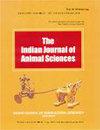A novel SNP (c.1311C>T) on heat shock protein 70 (HSP70) gene of Kacang goat in Indonesia
IF 0.3
4区 农林科学
Q4 AGRICULTURE, DAIRY & ANIMAL SCIENCE
引用次数: 0
Abstract
Heat shock proteins (HSPs) associated with stress reactions play an important role in cell survival by activating numerous regulatory proteins and inducing black apoptosis. This study aimed to identify the potential SNPs of HSP70 gene in Kacang goats in Indonesia. Forty-three Kacang goats were selected from Sidoarjo and Tulungagung districts. The DNA isolated from blood samples was successfully amplified using the polymerase chain reaction (PCR) method with a pair of primers. The PCR products were sequenced in the coding region. The sequences were successfully aligned to determine the potential SNPs. A novel SNP (c.1311C>T) was found in this study. This SNP was categorized as a synonymous mutation. The insertion-deletion (in-del) mutation was also observed at the 1151stand 1161st nucleotide positions. Based on these mutations, four haplotypes were constructed where haplotype 1 had the highest frequency in Sidoarjo. Indonesian goats had no close relation with Iraqi goats according to Neighbor-Joing with Kimura’s 2-parameter approach. Haplotypes 1 and 2 in Indonesian goats had three different bases with all haplotypes in Iraqi goats in Median Joining Network. The study concluded that a novel SNP of HSP70 gene was identified in Kacang goats.印度尼西亚Kacang山羊热休克蛋白70 (HSP70)基因的新SNP (c.1311C>T)
与应激反应相关的热休克蛋白(HSPs)通过激活多种调节蛋白,诱导黑色细胞凋亡,在细胞存活中发挥重要作用。本研究旨在鉴定印度尼西亚Kacang山羊HSP70基因的潜在snp。43只加仓山羊是从西多阿乔和图伦加贡地区挑选的。采用聚合酶链反应(PCR)方法,用一对引物成功扩增了血样中分离的DNA。PCR产物在编码区测序。成功地对这些序列进行比对以确定潜在的snp。本研究发现了一个新的SNP (c.1311C>T)。该SNP被归类为同义突变。在1151stand 1161个核苷酸位置也观察到插入-缺失(in-del)突变。基于这些突变,构建了4个单倍型,其中单倍型1在Sidoarjo中频率最高。根据Kimura的2参数邻接法,印度尼西亚山羊与伊拉克山羊的亲缘关系不密切。印度尼西亚山羊的单倍型1和2与伊拉克山羊的所有单倍型有3个不同的碱基。本研究在卡仓山羊中发现了一个新的HSP70基因SNP。
本文章由计算机程序翻译,如有差异,请以英文原文为准。
求助全文
约1分钟内获得全文
求助全文
来源期刊

Indian Journal of Animal Sciences
农林科学-奶制品与动物科学
CiteScore
0.60
自引率
25.00%
发文量
220
审稿时长
8 months
期刊介绍:
Articles published in The Indian Journal of Animal Sciences encompass a broad range of research topics in animal health and production related to cattle, buffalo, sheep, goat, camel, equines, pig, rabbit, yak, mithun, poultry and fisheries. Studies involving wildlife species and laboratory animal species that address fundamental questions about their biology will also be considered for publication. All manuscripts must present some new development and must be original, timely, significant and scientifically excellent. Papers will be rejected if standards of care of, or procedures performed on animals are not up to those expected of humane veterinary scientists. At a minimum, standards must meet the International Guiding Principles for Biomedical Research involving Animals, as issued by the Council for International Organizations of Medical Sciences. (C.I.O.M.S., c/o WHO, CH 1211 Geneva 27, Switzerland). Articles reporting new animal disease must follow GOI directive as given in detail in Guidelines to Authors.
 求助内容:
求助内容: 应助结果提醒方式:
应助结果提醒方式:


